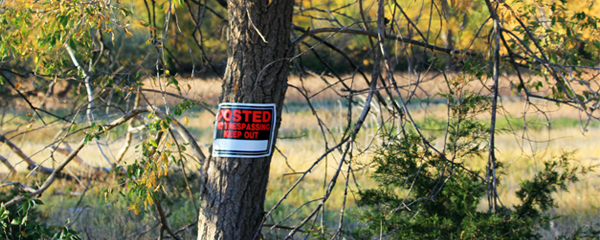Hunters must ask for permission before hunting on private land
PRATT – Hunters can face serious penalties for hunting on private land without landowner
permission, and however tempting a trophy-sized buck, or a pond covered in greenheads may be, the consequences will always outweigh the perceived reward. With firearm season just around the corner, the Kansas Department of Wildlife, Parks and Tourism (KDWPT) reminds all hunters that it is illegal to hunt on private land, posted or not, without the owner's permission. Whether someone actually enters private land without permission or shoots onto it from the road or another landowner's property without permission, it is illegal.
Trespassing affects more than just the immediate parties involved. The perception of the hunting community as a whole and our hunting heritage are just a couple pieces of the puzzle affected by illegal hunting practices. Because trespassing harms landowner-hunter relations — and because the penalties for trespassing can be severe — hunters should be aware of the following trespass issues:
- landowner permission should be obtained before pursuing wounded game onto private property. If the landowner cannot be found, contact a local natural resource officer or sheriff's office;
- hunting from roads or railways without legal permission is a form of trespassing called criminal hunting;
- conviction of trespass or criminal hunting may prevent the convicted person from enjoying hunting privileges in other states. KDWPT is a member of the Wildlife Violator Compact, that includes 34 other states. Under this compact, anyone who has had hunting, fishing, or furharvesting privileges revoked or suspended in a member state cannot hunt, trap, or fish in other member states;
- conviction of simple criminal hunting can result in a maximum fine of $500, plus court costs, and one month in jail on the first conviction. Additionally, the court can suspend or revoke license privileges for up to a year. A second conviction requires at least a one-year suspension of privileges in addition to any fines or jail time;
- if big game or turkey hunting is involved, the penalties get stiffer. Upon first conviction, the law states that the violator "shall not be fined less than $500 nor more than $1,000 or be imprisoned in the county jail for not more than six months, or both." The law requires fifth and subsequent conviction penalties of a minimum $1,000 fine and minimum 90 days in jail;
- criminal trespassing is when the violator does not leave property when told;
- it is illegal to hunt on land posted with written permission signs or marked with purple paint without having written permission on one's person;
- in any of these cases, hunting privileges may also be revoked; and
- by law, all hunters must have permission whether the land is posted or not.
Kansas’ wildlife resources should not only be revered, but respected. Before a hunter contemplates hunting on private land without landowner permission, the long term and widespread affect those actions will have on the future of Kansas hunting should be considered.
If you witness trespassing or illegal hunting, report it to your local natural resource officer, sheriff's office, or call the Operation Game Thief toll-free hotline at 1-877-426-3843. A list of phone numbers for all natural resource officers, listed by counties they cover, can be found in the 2013 Kansas Hunting & Furharvesting Regulations Summaryavailable wherever licenses are sold, or online at www.ksoutdoors.com.



No comments:
Post a Comment